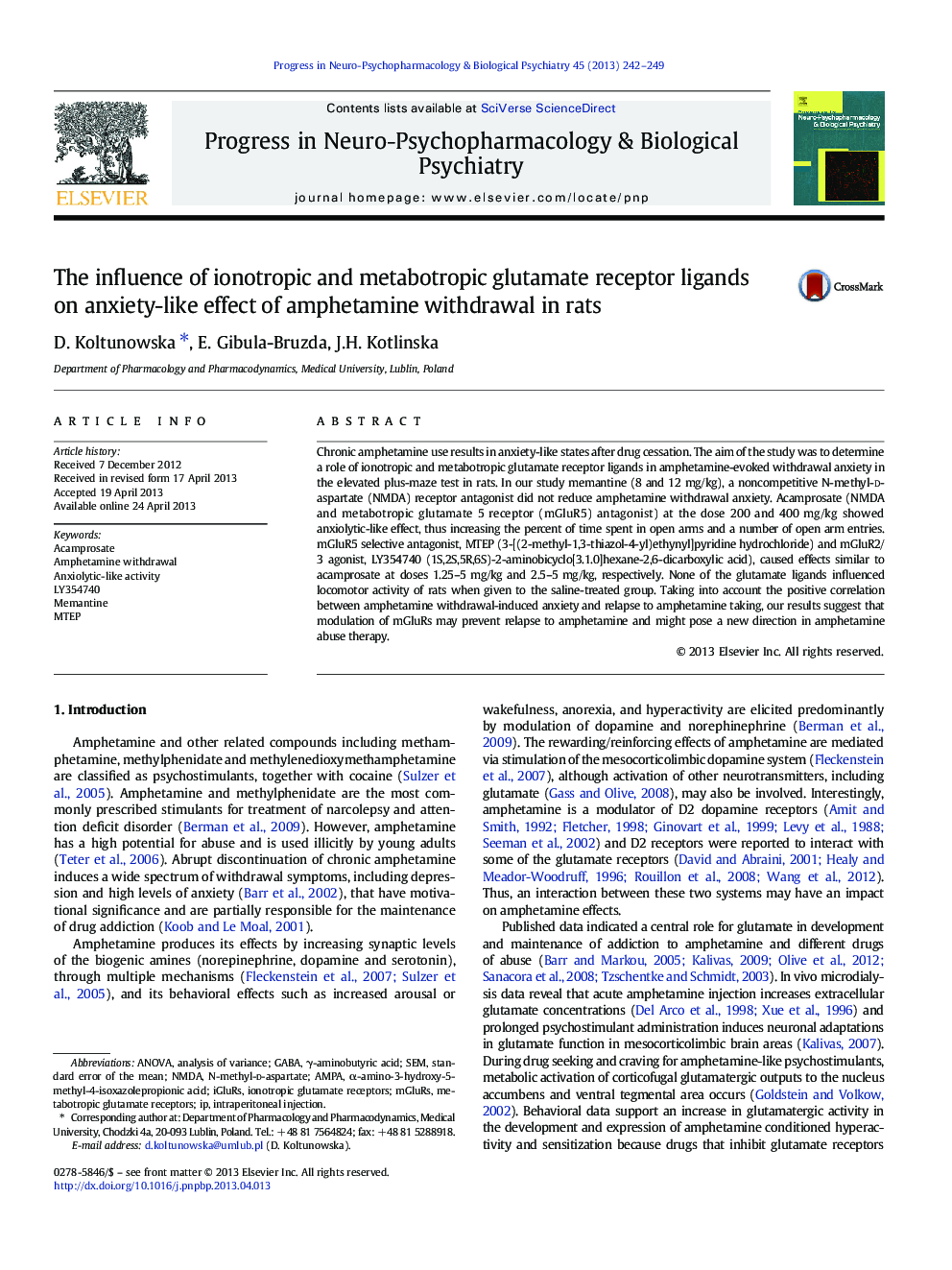| کد مقاله | کد نشریه | سال انتشار | مقاله انگلیسی | نسخه تمام متن |
|---|---|---|---|---|
| 5844833 | 1561049 | 2013 | 8 صفحه PDF | دانلود رایگان |
عنوان انگلیسی مقاله ISI
The influence of ionotropic and metabotropic glutamate receptor ligands on anxiety-like effect of amphetamine withdrawal in rats
ترجمه فارسی عنوان
تأثیر لیگاندهای گیرنده یونوتروپیک و متابوتروپیک گلوتامات بر اثر اضطراب مانند برداشت آمفتامین در موش صحرایی
دانلود مقاله + سفارش ترجمه
دانلود مقاله ISI انگلیسی
رایگان برای ایرانیان
کلمات کلیدی
LY354740AcamprosateAMPAMTEPNMDAN-methyl-d-aspartatemGluRsiGluRsα-amino-3-hydroxy-5-methyl-4-isoxazolepropionic acid - اسید α-آمینو 3-هیدروکسی-5-متیل-4-ایزوکسول پپونیکγ-aminobutyric acid - اسید γ-آمینوبوتیریکanalysis of variance - تحلیل واریانسANOVA - تحلیل واریانس Analysis of varianceintraperitoneal injection - تزریق داخل صفاقیstandard error of the mean - خطای استاندارد میانگینAnxiolytic-like activity - فعالیت غیر فعال مانندSEM - مدل معادلات ساختاری / میکروسکوپ الکترونی روبشیMemantine - ممانتین GABA - گاباMetabotropic glutamate receptors - گیرنده های متابوتروپیک گلوتاماتionotropic glutamate receptors - گیرنده های گلوتامات یوناتروپیک
موضوعات مرتبط
علوم زیستی و بیوفناوری
علم عصب شناسی
روانپزشکی بیولوژیکی
چکیده انگلیسی
Chronic amphetamine use results in anxiety-like states after drug cessation. The aim of the study was to determine a role of ionotropic and metabotropic glutamate receptor ligands in amphetamine-evoked withdrawal anxiety in the elevated plus-maze test in rats. In our study memantine (8 and 12Â mg/kg), a noncompetitive N-methyl-d-aspartate (NMDA) receptor antagonist did not reduce amphetamine withdrawal anxiety. Acamprosate (NMDA and metabotropic glutamate 5 receptor (mGluR5) antagonist) at the dose 200 and 400Â mg/kg showed anxiolytic-like effect, thus increasing the percent of time spent in open arms and a number of open arm entries. mGluR5 selective antagonist, MTEP (3-[(2-methyl-1,3-thiazol-4-yl)ethynyl]pyridine hydrochloride) and mGluR2/3 agonist, LY354740 (1S,2S,5R,6S)-2-aminobicyclo[3.1.0]hexane-2,6-dicarboxylic acid), caused effects similar to acamprosate at doses 1.25-5Â mg/kg and 2.5-5Â mg/kg, respectively. None of the glutamate ligands influenced locomotor activity of rats when given to the saline-treated group. Taking into account the positive correlation between amphetamine withdrawal-induced anxiety and relapse to amphetamine taking, our results suggest that modulation of mGluRs may prevent relapse to amphetamine and might pose a new direction in amphetamine abuse therapy.
ناشر
Database: Elsevier - ScienceDirect (ساینس دایرکت)
Journal: Progress in Neuro-Psychopharmacology and Biological Psychiatry - Volume 45, 1 August 2013, Pages 242-249
Journal: Progress in Neuro-Psychopharmacology and Biological Psychiatry - Volume 45, 1 August 2013, Pages 242-249
نویسندگان
D. Koltunowska, E. Gibula-Bruzda, J.H. Kotlinska,
